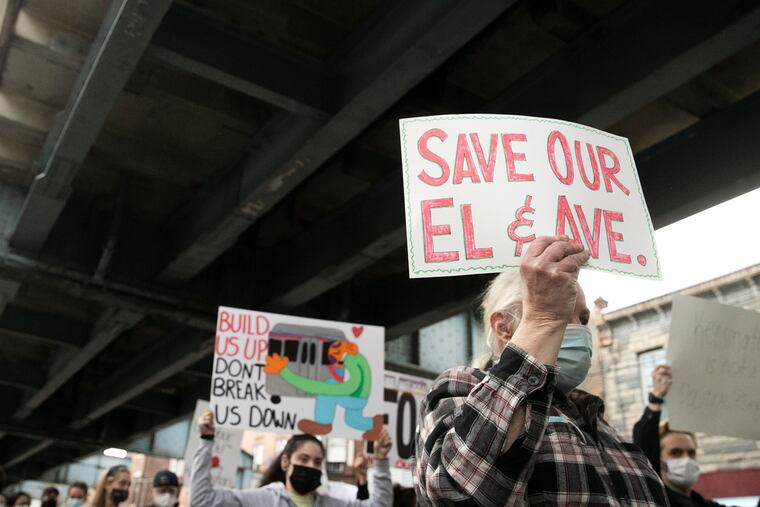10 things the Kenney administration must do in Kensington | Opinion
Mayor Kenney promised "meaningful change" last week. Here's what that should look like.

Last Tuesday I was one of several hundred neighbors, community members, and representatives of nonprofit organizations who attended the protests surrounding the closure of the Somerset El stop. I was disappointed to see no one from the Kenney administration in attendance. Instead, the direct action of the neighborhood coupled with intense pressure from a series of calls organized by City Councilmembers Maria D. Quiñones-Sánchez and Mark Squilla with SEPTA has egged on the agency to move more quickly.
With the tumult of last summer’s social unrest, we saw the departure of the city’s managing director, Brian Abernathy, who, while imperfect, had a good sense of the situation in Kensington and attended many of the meetings during the Resilience Project, which mobilized 35 city departments to combat the opioid epidemic that has been ravaging Kensington for years. Since moving into the managing director’s position last summer, Tumar Alexander — who ran the Resilience Project — has been unable to enact any meaningful change in Kensington.
On Thursday, when SEPTA announced the reopening of the Somerset station, Mayor Jim Kenney issued a statement saying, “These are extremely complex societal issues we are all grappling with,” and he pledged “meaningful changes along the Kensington Avenue corridor.”
» READ MORE: SEPTA will reopen troubled Somerset El Station in Kensington on Monday
As a partner in Jasper Studios, based in Kensington, I seek to create opportunities for creatives and entrepreneurs by rehabbing old buildings into workspaces. I am passionate about creating a more equitable city where everyone can feel safe.
If the mayor is promising meaningful change, here are some suggestions for what should happen next:
Redeclare a Kensington-wide state of emergency to allow the neighborhood access to additional funding during a potentially fiscally hard time in the city.
Immediately create an Office of Emergency Service for Kensington to be continually funded until on-street overdose deaths fall below a reasonable threshold determined by the Department of Public Health and agreed to by City Council. This office must have a leader in charge who has a track record of cutting through red tape and getting things done quickly. The office would be charged with integrating the services that would be needed to achieve a habitable semblance for the neighborhood.
Create a special fund for current residents of Kensington for economic and emotional counseling/trauma support.
Immediately apply for all available block grants made available through the recent stimulus package or through the opioid lawsuit payout to secure enough beds in Philadelphia to provide no-barrier medically assisted treatment beds for 100% of the people on the streets in Kensington.
Create a 90-day zero-tolerance zone for selling and injecting drugs on the streets of Kensington (bound by Lehigh, Trenton, Tioga, and Front Streets), deploying enough resources and coordination with treatment providers to create a respite for a neighborhood under siege for many years. A model that Philadelphia should consider during this time is Buffalo, N.Y.’s Opioid Intervention Court, which “relies on day-of-arrest intervention, evidence-based treatment, daily judicial supervision, and wrap-around services to prevent overdose death.”
Partner with Pathways to Housing to expand their housing-first program to provide adequate housing to Philadelphia residents coming out of treatment.
Direct the Streets Department to pick up trash in this neighborhood five times per week — this is necessary because the significant number of unhoused individuals creates an excessive amount of trash throughout the week.
Create temporary safe spaces for people in addiction to congregate so they don’t have to treat SEPTA stops like shelters because they’re the only safe places available.
Accelerate the rate at which the Philadelphia Land Bank acquires and develops properties in this neighborhood to provide affordable housing options.
Fund local nonprofit organizations such as NKCDC or Impact Services to acquire derelict vacant properties that serve as drug houses to temporarily seal and then rehab to create affordable opportunities for neighborhood residents to gain housing.
» READ MORE: Shuttered El stop illuminates depths of Philly's entrenched social problems
I am under no illusions that this is the panacea that will bring this unfortunate episode to an end. However, the current status quo has got to change, and getting the city to do something is where the neighborhood and other concerned citizens need to orient themselves.
Leo Voloshin is an entrepreneur based in Philadelphia and a partner in several buildings that serve creatives and entrepreneurs in the Kensington area.